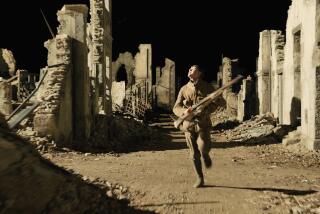Battle at ‘The River Kwai’
- Share via
Reader Mark Landsbaum, so scornful of The Times for describing “The Bridge on the River Kwai” as an “antiwar movie” (Letters, “ ‘Kwai’s’ Messages,” May 7) reminds me of the fellow pontificating so pompously about Marshall McLuhan in “Annie Hall” that Alvy (Woody Allen) is forced to reach off-screen and produce McLuhan himself in order to refute the guy’s wrongheadedness. Not being so fortunate, I can’t produce director David Lean or screenwriters Carl Foreman and Michael Wilson, but it’s easy enough simply to point to the evidence on screen.
I invite Mr. Landsbaum to take another look at the film, if he hasn’t done so recently (and frankly I suspect he hasn’t). Among many scenes and themes, I would cite: the horrifying moment when the boyish young British and Japanese soldiers suddenly find themselves face to face; neither of them can make the first, deadly move, and it falls to one of the Britisher’s veteran comrades to slay the enemy. What’s more, it is in the name of good soldiering that Alec Guinness’ British colonel has his men collaborating with the enemy on building the bridge. “What have I done?” he says before dying, suddenly aware of what his good soldiering has led to. And, of course, in the confusion of the final slaughter, the lines between friend and foe are blurred as men meet their death from “friendly fire.”
It has been suggested that the movie’s final line, in which British officer James Donald screams “Madness! Madness!” is the one flaw in a brilliant film because it merely repeats and makes blatantly obvious what the whole film has been dramatizing for over 2 1/2 hours--but apparently not blatant or obvious enough for Mr. Landsbaum.
PRESTON NEAL JONES
Hollywood
*
In addition to his oversimplified interpretation of a very complex story, Mr. Landsbaum also conveniently ignores three key elements to this film.
Each and every one of the principal characters either goes insane at some point in the picture or is already insane as the movie begins.
Not just an incidental footnote: The two men who wrote the screenplay were blacklisted, labeled “communist subversives” by HUAC during the McCarthy era. Now, whatever they were, they were not the type of story writers to paint an obvious, oversimplified, right-against-wrong, good-versus-evil portrait of any war--even this one.
As part of the plot’s resolution, as well as serving the mission’s objective, a lower-ranking American Ally (William Holden) and a British colonel (Guinness), both of whom are supposed to be on the same side in the war, face off against each other with intent to kill. If this alone isn’t a prime example of depicting the chaos and insanity of armed conflict between nations, then there is no such thing as an antiwar movie and all bets are off.
RICHARD GILLETTE RODRIGUEZ
Newport Beach
More to Read
Only good movies
Get the Indie Focus newsletter, Mark Olsen's weekly guide to the world of cinema.
You may occasionally receive promotional content from the Los Angeles Times.






